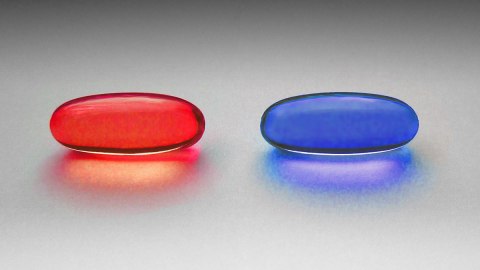Would You Take An Exercise Pill?

Since humans began ingesting nutrients and medicines in pill form, the possibility of fixing every problem via this mechanism has tantalized the imagination. Depressed? Angry? Unable to focus? Sexually dysfunctional? Someone, somewhere has a pill for that. How about a pill that will exercise for you?
Okay, that’s not quite how it works, but the idea of providing the same physiological mechanisms of exercise—namely, cardiovascular health and weight loss—by swallowing a pill is closer than you might think.
One pill in particular (GW501516) mimics the effects of endurance exercise on the gene PPAR-delta. When 516 binds to this gene it boosts a signal to burn fat. So far this experiment is working in two mice, dubbed Couch Potato Mouse and Lance Armstrong Mouse.
These mice are residents of San Diego’s Salk Institute, where both enjoy a plentiful diet of a fat-sugar mix that tastes like cookie dough. Both rodents are also sedentary; Lance isn’t out huffing it on a wheel all day. The only difference is that Couch Potato does not get his daily 516, which is why he’s fat and greasy. Lance, by contrast, exhibits tons of energy while maintaining a sleek figure.
516 was initially created by GlaxoSmithKline when chemical biologist Tim Wilson was looking for ways to treat diabetics. Initial results on obese monkeys showed an increase in good cholesterol and a reduction in bad cholesterol, insulin levels, and triglycerides. At the time Wilson believed he stumbled upon a metabolic syndrome wonderdrug.
His hopes held until 2007, when the pharmaceutical giant shelved 516 as long-term toxicity effects started rolling in. Animal studies showed evidence of rapidly developing cancers in a number of organs. Without a seventy-year trial the company was concerned the FDA would not feel the consequences were worth lower cholesterol.
Cue fitness fanatics. Around the time 516 was being shelved, molecular and developmental biologist Ron Evans started injecting the above mice. Though the World Anti-Doping Agency (WADA) banned 516 in 2009, steroid message boards are filled with anecdotal test cases, in part due to evidence from Evans’s lab. The drug prevents you from “hitting the wall” too soon due to a boost in your reserves of adenosine triphosphate (ATP). With a bit of tweaking Evans hopes this switch becomes genetically encoded:
We proved that endurance could be genetically engineered through this particular switch. And the switch stayed on, and could be passed on as a genetic trait. You could have a whole lineage of long-distance-running mice.
Even without actually running, the mice remain svelte and energized. Could it work in humans? Evans is responsible for letting WADA in on his research before his famous study, published in the journal Cell, set the Internet on fire. Cycling and running competitors were monitored, but not the ripped dude snapping shirtless selfies in the gym. For roughly $1,000 per ten grams ungodly bursts of endurance arrive packaged at your door.
Which is, in many ways, what Evans wants: a genetic enhancement that makes you last longer while growing stronger. What of those whose goal is to binge on The Deuce while shoveling in pints of cookie dough ice cream? We’re already attuned to expecting instant gratification for as little work possible. What if no work provides even better benefits?
The seduction of quick results combined with a lack of foresight regarding potentially crippling effects has undone our fantasies time and again. This is our genetic inheritance, an ongoing battle between energy conservation and nomadic wandering. Since we no longer need to hunt, conservation wins out. We have to motivate ourselves to put in the work to stay healthy.
Which is quite easy for some, sometimes to unhealthy degrees. “Chronic cardio” is one example of trim waistline obsessed gym rats. Pills like 516 and others—there are a number of others coming down the pipeline—might get you that extra mile on training day, but it could also get you to skip every mile. It’s hard to see the benefit of not moving at all, given the evolutionary necessity of movement. But if rocking rock-hard abs for your million Instagram followers is possible without the planks and HIIT, we’d be fooling ourselves if believing many won’t try.
To counteract sedentary habits the fitness industry now has $3 trillion in assets worldwide. Every year American health clubs rake in $27 billion from 55 million members. Sure, Planet Fitness counts on you not going for its success, but many take fitness seriously. Endurance pills might appeal to both ends: those looking to push their workouts to the next level and those who would rather just enjoy the free pizza at the front desk.
How to navigate these unchartered waters? University of California, Riverside biologist Theodore Garland suggests an ideal solution. Instead of designing drugs to replace exercise, or even to enhance it, how about a pill getting you on the treadmill or swinging a kettlebell in the first place?
Personally, I’ve been more interested in the possibility of drugs that would make us more motivated to exercise.
We can’t stop the exercise pills. They appeal to too many people brought up on too many science fiction tales. 516 might not survive clinical scrutiny, but given the complete lack of oversight of nutritional supplements such self-prescribed performance enhancers will soon be as common as green tea and acai weight-loss pills.
A little boost is not necessarily bad—caffeine is my pre-workout and pre-writing ritual. Before the onslaught begins, though, we should at least understand the costs. A few years of increased endurance aren’t worth a complete lack of it in the end.
—
Derek is the author of Whole Motion: Training Your Brain and Body For Optimal Health. Based in Los Angeles, he is working on a new book about spiritual consumerism. Stay in touch on Facebook and Twitter.





